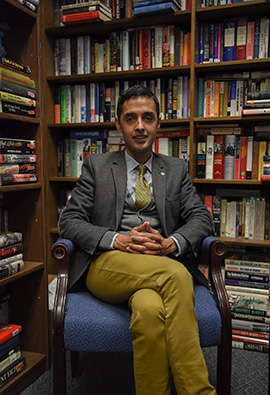Spotlight on professor Anand Toprani: From analyst to academia


(U.S. Navy photo by Jaima Fogg/released)
Anand Toprani is an accidental professor.
Although he earned degrees in history from Cornell, Oxford and Georgetown universities, Toprani wanted a career in government -- not academia.
“I didn’t want to be a historian,” Toprani said with a chuckle.
“I devoted all of my attention to working at State or working in the intelligence community. That’s where I thought someone with my background would be most suited.”
His background reads like a world map. Born to Indian parents working in Abu Dhabi, Toprani grew up in Canada, specifically the picturesque backdrops of Calgary and Vancouver.
He came to the United States for college in upstate New York and eventually naturalized as an American citizen.
Toprani did enjoy a career out of a Tom Clancy novel for awhile.
Right out of graduate school, he landed an analyst job at U.S. Central Command in Tampa, Florida – the beating heart of war planning for the ongoing wars in Iraq and Afghanistan.
He loved it.
In early 2013, CENTCOM had perhaps 1,000 analysts working on current military operations and emerging issues in the Middle East. James N. Mattis, now secretary of defense, was in command.
Toprani worked in a group that did long, in-depth studies on special topics – sometimes with U.S. Special Operations Command and foreign intelligence agencies.
“If I stayed there, I hoped to go overseas and eventually that I’d be able to go to D.C.,” he said.
Then sequestration torpedoed U.S. military spending, and CENTCOM’s analyst floor took a budgetary broadside hit.
Toprani landed right back where he started – academia, specifically the geopolitics of energy. His dissertation had focused on oil strategy in Great Britain and Germany between World War I and World War II.
That’s the topic of his first book, to be published by Oxford University Press in spring 2019.
Now, after five years on the Naval War College faculty, he teaches in the strategy and policy department. The subject matter is mostly historical case studies of military warfare over the past century.
Those lessons are timeless, Toprani said, even for students who are modern-day military officers and will be fighting the next war with drones and cyberattacks.
“We don’t talk about hardware. People ask me about that stuff all the time. I’ve studied enough about war to understand that hardware doesn’t really win or lose you wars,” the history professor said.
“Ideally, for me the big takeaway from studying strategy is just giving people a sense of what force can and cannot accomplish.”
Combat is unpredictable and inefficient as a tool and should be reserved for the last resort: That’s a message he delivers to his active-duty military students.
“At some level, they lived it. They don’t need me to tell them that,” Toprani said. “They’ve seen failure at a specific level. They know things didn’t work out well in Iraq or Afghanistan.
“I’ve found that, when it comes to the issues I’m concerned about, I’ve never met a group of students who are more receptive to asking hard questions about what it is they do and its value.”
Toprani is working on pinpointing his next research topic for publication. He can be found among the ceiling-high shelves that carve his office into a maze of books.
There must be hundreds of titles – Toprani has no idea.
He simply keeps buying interesting used titles online.
“I try to organize them by subject, writ large,” he said, though he added: “But I can no longer keep track.”
Visit Faculty Profile